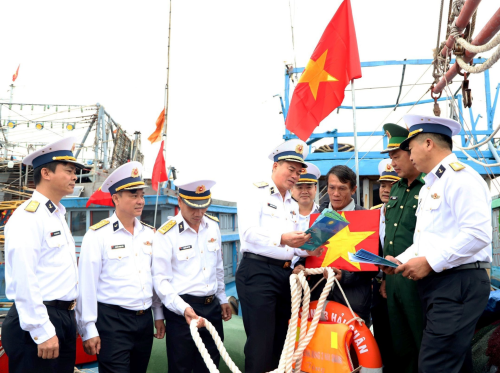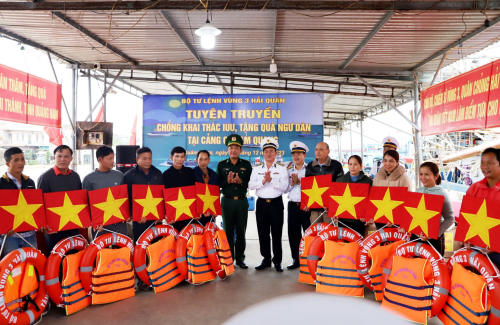By thoroughly grasping and implementing the Party's viewpoints and directives, as well as the state's policies and laws concerning the development of the marine economy alongside the protection of maritime and territorial sovereignty, Naval Region 3 is actively and effectively carrying out the programme "Vietnam Navy serves as a strong for fishermen’s operations at sea". This entails vigorous promotion, mobilisation, support, and protection of fishermen in safely and legally harvesting marine resources. Such efforts are instrumental in building an all-people defence posture at sea, ensuring the robust protection of the nation's maritime and territorial sovereignty in the new context.
 |
| Naval Region 3 conducts legal propaganda for fishermen in Nui Thanh district, Quang Nam province |
Since 2019, the Region’s Party Committee and Command and the leadership and commanders at all levels have closely followed the content of the "Vietnamese Navy serves as a strong for fishermen’s operations at sea" programme to enhance leadership, direction, and organisation of specific and rigorous execution in line with their functions, duties, and operational areas. Agencies and units have proactively coordinated with the Propaganda Department, the Fisheries Sub-department, the Border Guard, and military agencies of coastal provinces and cities in developing plans and organising awareness-raising and responsibility-enhancing propaganda regarding the task of protecting maritime and island sovereignty, legal compliance in fishing activities, and consolidating fishermen's confidence in operating at the high seas. Immediately after signing the coordination programme with the localities, overcoming the challenges posed by the COVID-19 pandemic, the Region proactively developed plans and conducted propaganda using diverse and rich forms and methods, through dozens of sessions linked with cultural exchanges, art performances, seminars, forums, tours, exhibitions, knowledge contests, etc., attracting broad public participation and creating significant impact. Numerous conferences, training classes, and propaganda sessions for fishermen, boat owners, captains, village officials, representatives of associations, unions, and professional fishermen's groups were held tightly and effectively by the Region. Alongside, the Region intensified extensive propaganda across central and local mass media; proactively compiled documents, flyers, brochures, and promotional posters to distribute to communes, districts, organisations, and groups; and actively promoted and mobilised fishing boat owners to commit not to violate foreign maritime zones, not to use explosives, prohibited substances, etc., in fishing. This approach was implemented by its fleets in conjunction with their patrol, inspection, and control tasks, to directly propagate to fishermen on the fishing grounds and at every fishing vessel.
In terms of content, the Region has not solely focused on the basic aspects of our country's laws, international maritime agreements, safe and sustainable fishing practices in accordance with the law, linked to environmental protection, and combating illegal exploitation, etc, but also emphasised equipping fishermen with knowledge on communication methods, identification of unknown targets at sea; areas for sheltering from storms, disaster warnings, and rescue operations; locations of logistical and technical service centres for fishing in the Spratly Islands, and the positions of oil rigs for fishermen to recognise and have the skills to handle emergencies. They have also focused on propagation of the Party's viewpoints and policies on resolving maritime disputes, coupled with timely direction of public opinion and combat against the wrongful narratives of hostile forces. As a result, the awareness and responsibility of agencies, organisations, associations, and the public towards the task of protecting the nation's maritime and territorial sovereignty have been elevated, creating conditions to mobilise multiple resources in support of fishermen to set sail and adhere to the sea.
Guided by the principles "Care for the people as if they were our own relatives" and "Assisting fishermen is a command of the heart," the Region has undertaken synchronised policies and measures, leveraging collective strength to effectively fulfil the task of supporting and aiding fishermen in their sea-based fishing and harvesting activities. The Region has worked closely with localities in guiding and implementing policies for the development of the maritime economy and encouraging and supporting fishermen in offshore fishing. Its agencies and units have actively participated in building new rural areas and sustainable poverty eradication; integrated with other movements and programmes such as "Gratitude repayment," "The Navy supports fishermen's children," etc., to harness the collective strength of organisations and forces in supporting fishermen and their families to stabilise their lives; and proactively exchanged information and firmly grasped local fishermen's activities to support food, provisions, fuel, fresh water, emergency repairs, machinery and equipment fixing, and search and rescue operations, ensuring the safety of lives and property of fishermen in difficult and dangerous situations at sea. Since 2019, the Region has mobilised hundreds of ships and boats, along with thousands of cadres and soldiers to participate in search and rescue operations, assist fishermen in preventing and mitigating natural disasters, and repair boats, timely rescuing over 30 drifting fishing boats with engine failures, and participating in the rescue of more than 120 fishermen who were ill or in distress at sea and announced decisions on sponsoring 12 students who are fishermen's children facing difficult circumstances in the area.
 |
| Conducting propagation about IUU fishing and presenting gifts for fishermen in Quang Nam province |
Understanding the hardships and dangers fishermen face in their livelihoods, the forces of the Region operating at sea have closely integrated surveillance, patrolling, inspection, and control with the protection of fishing grounds and the legal activities, lives, and property of fishermen at sea, creating favourable conditions for fishermen to confidently adhere to the sea the fishing grounds, thereby fostering economic development. The units have guided fishermen to grasp the scope, boundaries, and overlapping waters; actively encouraged the community to engage in sustainable, safe, and legal fishing practices, without infringing upon foreign maritime territories; and consistently monitored the situation in adjacent maritime areas, timely identifying and conducting propaganda efforts to deter and expel thousands of foreign fishing vessels that violate and illegally exploit marine resources in Vietnamese waters, thus protecting traditional fishing grounds.
The efforts and perseverance of the cadres and soldiers of the Naval Region 3, in accompanying fishermen across every inch of the sea, have not only provided a pillar of strength for fishermen to confidently and securely set sail and adhere to the sea but have also been filled with humanistic values, significantly strengthening the solidarity between the military and the fishermen at sea. This has effectively enhanced the role of fishermen in participating in the protection of the sacred maritime and island sovereignty of the nation.
As a gateway facilitating international maritime transport routes, the Central maritime region holds a strategic position that offers advantages for the development of an open economic system and various types of maritime transport, services, and tourism. However, it also harbours numerous challenges and threats to the territorial sovereignty, maritime and island integrity, and national security from the sea. Therefore, leveraging the strengths of the sea and islands to boost economic development while enhancing the capability to protect national sovereignty and interests, as well as to preserve marine resources and the ecological environment, is imperative. Yet, offshore fishing by local fishermen currently faces many challenges, along with limitations in equipment, such as: a small number of vessels, low capacity, predominantly wooden boats, etc. The fishing practices of fishermen are mainly individual or in small groups, without forming large-scale production teams to support each other at sea. Facing the fierce waves of the high sea, fishermen greatly need solid support to confidently make a living at sea. Hence, facilitating conditions for fishermen to set sail, adhere to the sea, and develop economically in conjunction with protecting maritime and island sovereignty, becomes even more important and urgent. To contribute to fulfilling this responsibility, in the coming time, the Region will focus on effectively implementing the following key contents:
Firstly, it is necessary to continue to thoroughly understand and grasp the Party's viewpoints, directions, and policies, as well as the state's laws on the strategy of maritime economic development alongside the firm protection of the nation's sea and island sovereignty. Its agencies and units need to closely follow the orientation for maritime and island propaganda to identify suitable content that aligns closely with local realities and the evolving situation of protecting sea and island sovereignty; proactively coordinate with local party committees, governments, departments, committees, sectors, and organisations to effectively build and implement propaganda plans annually and for each phase; actively innovate the content and form of propaganda creatively and effectively, tailored to real conditions, meeting the information needs, public opinion, and concerns of fishermen, especially in face of complex, sensitive issues, and contingencies; cooperate with localities and related agencies, organise training and professional knowledge enhancement for cadres and crew members of ships on patrol, inspection, and control duties to protect fishing grounds, and implement Directive No.45/CT-TTg dated 13 December 2017, by the Prime Minister on "Some urgent tasks and solutions to address the European Commission's warning against illegal, unreported, and unregulated fishing"; and effectively carry out sea and island propaganda work linked with training and disseminating some basic knowledge of technical specialties on ships, and methods of first aid for people suffering from certain diseases or encountering accidents and risks at sea to fishermen.
Secondly, it is also essential to ensure regular, orderly, and effective information exchange between regional and local authorities to coordinate and grasp the situation comprehensively, and conduct review periodically to enhance the effectiveness of operational coordination, promptly address emerging difficulties, and identify suitable solutions to improve the quality and efficiency of work.
Thirdly, units should actively and proactively support and assist fishermen with specific, practical actions. This includes effectively continuing the "Navy supports fishermen's children" activities; enhancing coordination with localities in guiding and implementing maritime economic development policies; and actively participating in building new rural areas, eradicating hunger, reducing poverty, and supporting fishermen to stabilise their lives with practical deeds. The Region's ship units should closely integrate surveillance, patrolling, inspection, and control missions in maritime and island areas with protecting the legal activities of fishermen at sea and provide essential necessities, addressing emergencies, successfully completing search and rescue missions, and ensuring the safety of lives and property for fishermen in difficult and dangerous situations.
Finally, it is required to effectively highlight the role of fishermen in participating in the protection of sovereignty over seas and islands. The key objective is to continue to fully understand and effectively implement Decree No.30/2010/NĐ-CP dated 29 March 2010; Decree No.130/2015/NĐ-CP dated 18 December 2015, by the Government; and Circular No.153/2016/TT-BQP dated 30 September 2016, by the Ministry of National Defence on mobilising the resources of fishing vessels and civilian vehicles for participation in safeguarding sovereignty and sovereign rights in the maritime areas of the Socialist Republic of Vietnam. There is a need to foster close coordination with the Coast Guard and Border Guard in the handover and receipt of fishermen’s fishing vessels to reinforce and support the execution of tasks such as exercises or on-site confrontations, ensuring strict adherence to principles; proactively coordinate with local Party committees, authorities, and armed forces in the area in formulating plans, organising training sessions, enhancing communication skills, and preparing for emergency situations at sea for fishermen, coastal militia to actively engage in search and rescue missions; and vigorously participate in the defence to maintain the integrity of the nation's sovereignty over the sacred seas and islands of the Fatherland.
Rear Admiral NGUYEN DANG TIEN, Commissar of the Region